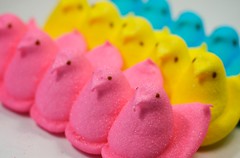Serendipity, Peeps, and Poetry
Brad Fruhauff
 Poet Barbara Crooker opens to serendipity in writing and reimagines the spiritual poem through a popular foamy candy.
I like to think all my writing resides at the intersection of faith and art. The two poems Relief 6.1 are part of my new book-length manuscript called Gold, which deals, in part, with the death of my mother, one of those dark times when everything we believe is called into question. It was a profound journey, and my attempt to write about it points out the gap that always exists between experience and creation, existence and depiction.
Poet Barbara Crooker opens to serendipity in writing and reimagines the spiritual poem through a popular foamy candy.
I like to think all my writing resides at the intersection of faith and art. The two poems Relief 6.1 are part of my new book-length manuscript called Gold, which deals, in part, with the death of my mother, one of those dark times when everything we believe is called into question. It was a profound journey, and my attempt to write about it points out the gap that always exists between experience and creation, existence and depiction.
In “Peeps,” I was trying to work with what was before me, the given, my mother’s love of those sweet marshmallowy treats, the way her face lit up when I found her a new variety. Those last years were difficult, and Peeps were one of her few delights. The poem strives to start there, and to end with Peeps becoming a parallel form of communion at the end of the poem. One of the things that sometimes bothers me with religious/spiritual poetry is that it uses the same old images (the rugged cross, the Easter lily) in the same old way. I’m pretty sure no one’s written about communion using purple chickens before.
I’m also a huge believer in serendipity as a means of providing materials for a poem. It is not possible to buy Peeps in the grocery store “out of season,” which means after Easter. (Hallowe’en, Christmas, Valentine’s Day, and Easter are the only Peeps-recognized holidays. I myself think they’re missing the mark on turkeys and flags.) So, I turned to the factory (we live near Just Born) to give me a supply, even though I had to buy them through the mail. In the end, I’d overbought, and so had the bittersweet pleasure of distributing Peeps among the people who loved my mother, both near and far (they harden into rocks out of their cellophane wrapper, but survive in the mail just fine).
Serendipity also provided the phoebe, who caught my attention when I was writing outdoors (en plein air) while at an artist colony. One of the jobs of writing, is, I think to wake us up, make us pay attention to the small things of the world that are going on right in front of us, things that we’re often too busy to take the time to stop and see. It’s also one of our jobs, as writers of faith, to appreciate God’s creation. So, in “Aubade,” I was watching the phoebe working on his nest (okay, it’s impossible to tell boy from girl in this species, but he “seemed” male to me) right in front of where I was also working with my pen and paper. I tried to listen to what he has to say. Again, words seem to be pretty paltry tools, and nests seem to be much more tangible constructs. Still, despite the distance between the poem in the head and the poem on the page, it always feels good to be working.
Barbara Crooker’s poems appear in a variety of literary journals, including The Christian Science Monitor, The Christian Century, Christianity and Literature, Sojourners, Rock & Sling, Ruminate, Literature and Belief, The Cresset, and anthologies, including Imago Dei: Poems from Christianity and Literature, Good Poems American Places (Garrison Keillor, editor), Looking for God in All the Right Places, and The Bedford Introduction to Literature. She has won a number of awards, including the 2003 Thomas Merton Poetry of the Sacred Prize (Stanley Kunitz, judge) and three Pennsylvania Council on the Arts Fellowships in Literature.